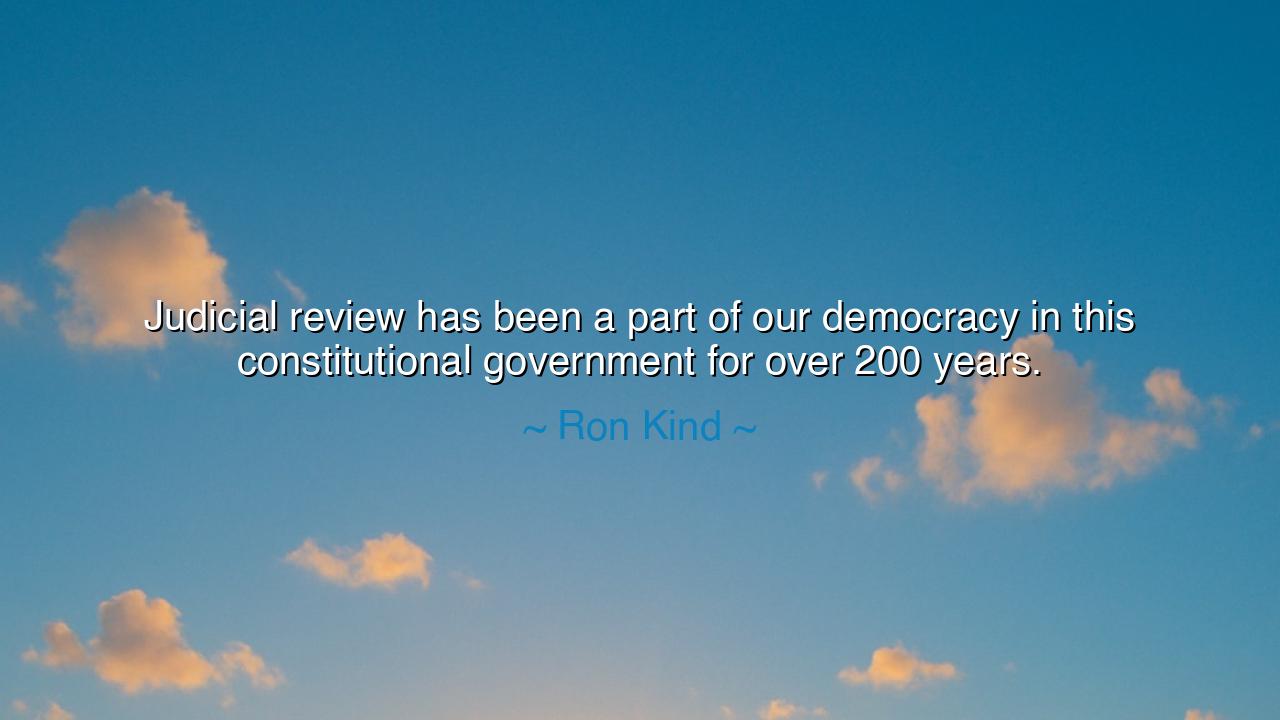
Judicial review has been a part of our democracy in this
Judicial review has been a part of our democracy in this constitutional government for over 200 years.






The words of Ron Kind, spoken with reverence for the enduring fabric of the Republic, remind us of one of the greatest pillars of American governance: “Judicial review has been a part of our democracy in this constitutional government for over 200 years.” In these simple but powerful words lies the acknowledgment of an ancient truth—the idea that law must stand above power, and that even the rulers themselves must be ruled by justice. Kind, a modern statesman, speaks not merely of a legal principle, but of a living covenant—one that binds the actions of men to the eternal scales of right and wrong. For judicial review is the guardian of liberty, the steady hand that keeps the Republic from falling into tyranny or chaos.
The origin of this idea traces back to the early dawn of the American experiment. In the year 1803, in the case of Marbury v. Madison, the Supreme Court of the United States, under Chief Justice John Marshall, declared that it was not only the right but the duty of the judiciary to review the acts of Congress and the executive to determine whether they conformed to the Constitution. This was not written explicitly in the text of the Constitution—it was born of reason, necessity, and courage. For if the laws of men could contradict the supreme law of the land without check, then the Constitution would be but parchment, and liberty a fleeting dream. Thus, judicial review became the compass of the Republic, ensuring that no branch of government could wander beyond its rightful bounds.
In the style of the ancients, let us meditate on this profound principle. The Constitution is the sacred covenant between the people and their government—a promise that power will serve justice, not devour it. Yet promises, if not guarded, turn to dust. Judicial review is the watchman who stands upon the walls of the Republic, looking not with bias or ambition, but with the clear eyes of law. When Congress overreaches, when presidents forget their limits, when passion clouds judgment, the courts rise to remind all that the law is sovereign. It is, as the ancients would say, the balance between the might of the sword and the wisdom of the scale.
History has shown the necessity of this balance. Consider the story of Brown v. Board of Education (1954), when the Supreme Court struck down the cruel doctrine of “separate but equal” and declared racial segregation in public schools unconstitutional. The legislatures had failed to uphold justice, and the executive hesitated to act. But through the power of judicial review, the court restored the promise of equality under the law. In that decision, the voice of the Constitution spoke once again, echoing across centuries: that the government exists to protect rights, not to deny them. This is the living legacy of the system Ron Kind praises—a system that, though imperfect, possesses the power to correct itself.
Yet, as in all things human, there is danger in imbalance. Judicial review is a double-edged instrument. When wielded wisely, it preserves liberty; when corrupted by politics or arrogance, it can strangle the will of the people. The ancient philosophers warned that every guardian must himself be guarded. So too must the judiciary remain humble before the Constitution it interprets. The justices are not kings robed in black—they are servants of the law, bound by its spirit and letter. The health of democracy depends not merely on their wisdom, but on the vigilance of a people who understand that liberty demands eternal watchfulness.
In truth, what Ron Kind reminds us of is not a mere historical fact, but a living tradition of restraint and balance. For over two centuries, judicial review has stood as a testament to the endurance of self-governance. It declares that might does not make right, and that even in the clamor of democracy, principle must prevail over passion. The court, though it may err, remains the quiet conscience of the Republic—a place where argument yields to truth, and truth yields to justice.
So, my children of the future, take this lesson to heart: the strength of a free nation lies not in its armies or wealth, but in its fidelity to law. Honor the courts not as rulers, but as guardians of your covenant with liberty. Study the Constitution; understand its wisdom. Demand that justice be done not only for the powerful, but for the humble and forgotten. And remember always that judicial review, though born in the chambers of judges, lives in the hearts of all who believe that freedom must answer to conscience and that no man, no president, no Congress, stands above the law.
For as long as this principle endures—as long as the courts are free and the Constitution supreme—the Republic shall live. It shall stumble, it shall strain, but it shall not fall, for its foundation is not the strength of men, but the majesty of justice, tempered by reason, and sustained by the courage of those who choose to defend it.






AAdministratorAdministrator
Welcome, honored guests. Please leave a comment, we will respond soon